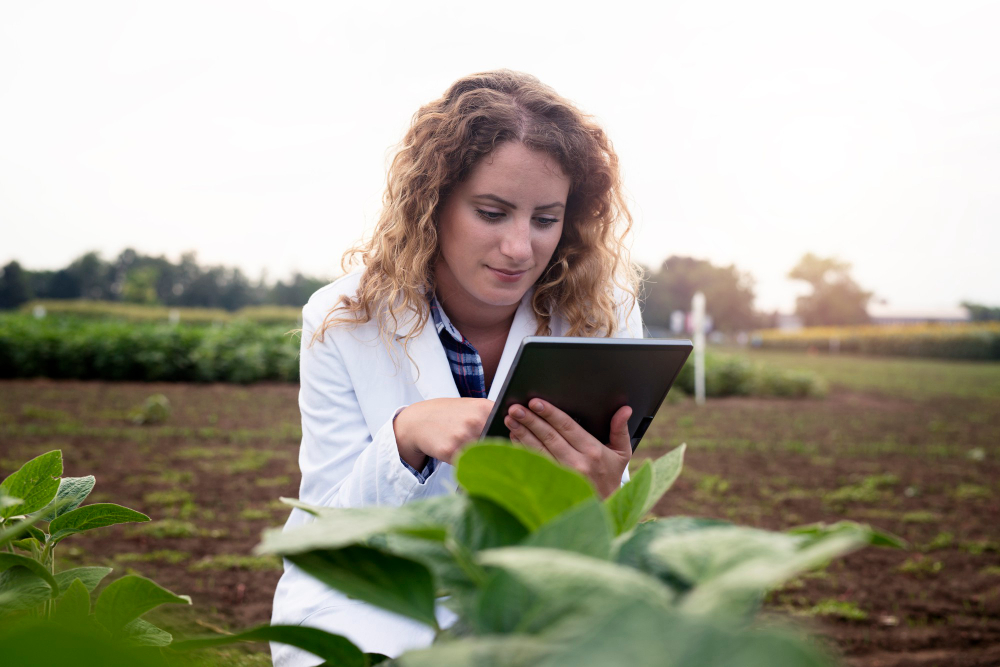It covers everything from crop and animal production to agri-business, environmental stewardship and food technology. If you’re interested in sustainability, food systems, biology or working in rural development, an Agriculture degree could be a smart and rewarding choice.
What Is Agriculture Like at University?
An Agriculture degree offers a mix of science, practical skills and business knowledge. You’ll study subjects such as crop science, soil health, animal husbandry, agronomy, pest management, agricultural economics and climate change. Many degrees also explore the role of technology in modern farming, such as precision agriculture, drones and data analytics. Courses often include lab work, field visits, placements and real-world case studies. Depending on your interests, you can specialise in areas like livestock, agribusiness, sustainable agriculture, food supply chains or agricultural policy.
How Long Does It Take and What Are the Options?
In the UK, most Agriculture degrees are three-year BSc (Hons) programmes. Some universities offer a four-year version with a placement or study abroad year. You may also find integrated master's degrees (MSc) or pathways that allow you to specialise as you progress. Agriculture is sometimes offered under slightly different titles like Agricultural Science, Sustainable Agriculture or Agri-Food Business. Some universities also run joint courses with subjects like Environment, Technology or Business Management.
How Will You Be Taught and Assessed?
You’ll learn through a combination of lectures, lab sessions, fieldwork, group projects and hands-on practical experience. Many courses work closely with real farms or research centres, giving you opportunities to work in the field. You’ll be assessed through a mix of exams, written assignments, lab reports, presentations and project work. Most final years include a research dissertation or major project on a topic of your choice.
What A Levels or Subjects Do You Need?
Entry requirements vary by university, but useful A levels and subjects include:
Biology — usually essential or highly recommended
Chemistry or Environmental Science
Geography
Maths or Economics
Some universities accept BTECs in Agriculture, Applied Science or Land-Based Studies. Experience on a farm, volunteering with conservation groups or involvement in food production projects can also help your application stand out. A genuine interest in rural affairs, sustainability or food systems is important.
What Skills Will You Develop?
An Agriculture degree gives you a blend of scientific, technical and management skills. These include:
Understanding of plant and animal biology
Knowledge of sustainable farming systems and food production
Data analysis and use of agri-tech tools
Project planning and problem-solving
Business and supply chain management
Environmental awareness and land management
Research, communication and teamwork skills
These skills prepare you for a wide range of careers in agriculture, science, business and beyond.
What Can You Do With an Agriculture Degree?
Graduates in Agriculture have strong employment prospects and can work in roles such as:
Farm manager or agronomist
Agricultural adviser or consultant
Soil or crop scientist
Animal nutritionist or livestock specialist
Agricultural policy adviser or sustainability officer
Agri-tech or precision farming specialist
Rural surveyor or land manager
Agri-food business manager or supply chain analyst
Many graduates also work in conservation, agricultural research, education or international development. Others go on to postgraduate study or professional training in areas like veterinary science, environmental science or agricultural engineering.
Studying Agriculture Abroad
Agriculture is a global industry, and many countries offer high-quality degrees with different specialisms depending on local farming systems and climate challenges.
USA
In the US, Agriculture is taught through land-grant universities known for strong research and extension programmes. Degrees such as Agricultural Science or Agri-Business are offered at institutions like Cornell, Texas A&M and UC Davis. Many US programmes include internships, lab work and access to large research farms.
Canada
Canadian universities such as the University of Guelph and the University of Alberta are known for agricultural innovation, especially in sustainable farming, animal science and food systems. Programmes often include co-op placements or industry collaborations.
European Union
Agriculture degrees are widely available across the EU, especially in countries like the Netherlands, Germany, France and Ireland. Wageningen University in the Netherlands is one of the world’s top institutions for agricultural and environmental sciences. EU programmes often include a strong sustainability focus and opportunities for field research.
Australia
In Australia, agriculture degrees are often linked to environmental science and land management. Universities like the University of Queensland and Charles Sturt University offer courses that prepare students for roles in farming, agribusiness, and rural development. Courses typically reflect Australia’s large-scale farming operations and climate challenges.
New Zealand
New Zealand universities such as Lincoln University and Massey University offer degrees in agriculture with a focus on livestock, pasture science and agri-business. There’s a strong emphasis on practical experience, sustainability and innovation in dairy and meat production.
Studying abroad can help you understand global food systems, explore new climates and gain international experience in a key industry.
Is Agriculture the Right Course for You?
Agriculture is ideal for students who want to work in a sector that matters for people, the planet and the economy. It suits those who enjoy both science and practical work, are interested in sustainability and food, and are keen to solve complex challenges. Whether you want to run a farm, advise governments, develop new technologies or work in agri-business, a degree in Agriculture gives you the knowledge, skills and experience to grow a meaningful and future-focused career.





